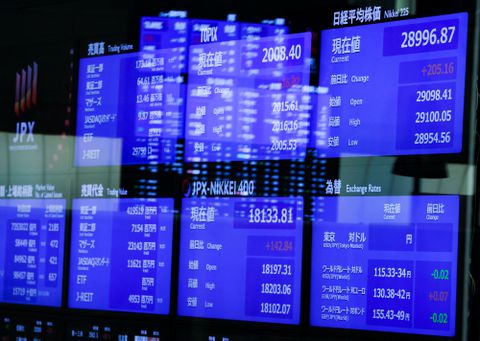Asian shares firmed on Monday as optimism about China's reopening offset concerns the Bank of Japan (BOJ) might temper its super-sized stimulus policy at a pivotal meeting this week, while a holiday in U.S. markets made for thin trading.
The yen climbed to its highest since May after rumours swirled the BOJ might hold an emergency meeting on Monday as it struggles to defend its new yield ceiling in the face of massive selling.
That had local markets in an anxious mood, and Japan's Nikkei (.N225) slipped 1.3% to a two-week low.
Yet MSCI's broadest index of Asia-Pacific shares outside Japan (.MIAPJ0000PUS) still added 0.9%, with hopes for a speedy Chinese reopening giving it a gain of 4.2% last week.
Chinese blue chips (.CSI300) extended their rally with a rise of 2.0%, while the yuan reached its highest since July.
EUROSTOXX 50 futures added 0.6%, while FTSE futures put on 0.1%. S&P 500 futures and Nasdaq futures edged up 0.1%, after a Wall Street bounce last week.
World leaders, policy makers and top corporate chiefs will be attending the World Economic Forum in Davos, and there are a host of central bankers speaking, including no fewer than nine members of the U.S. Federal Reserve.
The BOJ's official two-day meeting ends Wednesday and speculation is rife it will make changes to its yield curve control (YCC) policy given the market has pushed 10-year yields above its new ceiling of 0.5%.
The BOJ bought almost 5 trillion yen ($39.12 billion) of bonds on Friday in its largest daily operation on record, yet yields still ended the session up at 0.51%.
Early Monday, the bank offered to buy another 1.3 trillion yen of JGBs, but the yield stuck at 0.51%.
"There is still some possibility that market pressure will force the BOJ to further adjust or exit the YCC," JPMorgan analysts said in a note. "We can't ignore this possibility, but at this stage we do not consider it a main scenario."
"Although domestic demand has started to recover and inflation continues to rise, the economy is not heating up to the extent that a sharp rise in interest rates and potential risk of large yen appreciation can be tolerated," they added. "Thus, we think the economic environment does not strongly support consecutive policy changes."










